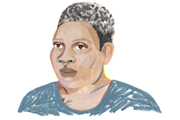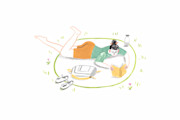One of the first questions for someone starting therapy is how to find the right mental health therapist to support you on your journey.
You’ll want to find someone you feel comfortable with and relate to.
You may initially be tempted to find a therapist the same way you might find a dentist: by asking your friends for recommendations.
However, it’s essential to acknowledge that your relationship with your therapist will be much more nuanced than the relationship with your dentist.
Perhaps you know you want to see a female therapist, or an LGBTQIA+-friendly therapist, or someone who treats ADHD, or someone who specializes in using psychodynamic therapy, EMDR, or cognitive behavioral therapy.

Why it’s a bad idea to see your friend’s therapist
You might turn to your friends for their advice. So, let’s say you mention to your friend that you’re searching for a therapist.
"Oh! You’ve gotta see Dr. Jackson!” he says. “She’s so smart and really helped me when I was going through that rough spell in March.”
Problem solved, right?
Eh, maybe not.
Effective talk therapy requires a huge amount of vulnerability.
“I definitely wouldn’t want to see a therapist who saw someone else I knew, unless they were super distant,” says Samantha,* 32. “I would be constantly obsessing about, ‘Do they think my friend is more together than I am?’ And wouldn’t be able to focus.”
“It’s almost like sleeping with the same guy as your best friend,” Brooke, 30, agrees. “You know you each have a private relationship with that person, but you can’t help but wonder who they really like more.”
This distracting, insidious feeling of jealousy or competition is, in fact, counterproductive.
Effective talk therapy requires a huge amount of vulnerability. You’re going to have to be really seen, warts and all, by your therapist.
Worrying about how you measure up against anyone else—including a friend (perhaps even especially a friend)—is a huge roadblock in the progress you’re there to make with yourself.
You may wonder what your friend has said about you prior to your meeting with the therapist. You may censor yourself from saying how you really feel about your friend, for fear your therapist feels a loyalty to them, having worked with them longer.
Either way, if you’re not being 100% open and on-task with your therapist, that’s going to hold you back.
This also puts your therapist in a really awkward position.
Plus, this interference could be exacerbated if you and your friend ever get into an argument. You might both be tempted to have your mutual therapist mediate, if not outright choose sides.

Say your friend winds up having therapy before you do. How would you feel seeing your therapist afterward? Defensive? Frustrated you didn’t get to tell your side of the story first?
This also puts your therapist in a really awkward position.
Dr. Ben Caldwell, PsyD and licensed marriage and family therapist, knows this all too well.
“As the therapist, should I pretend not to know about this fight?” he says. “That would likely feel awkward for us both. And what if you leave out part of the story of what happened, but based on what your friend said in their session, I believe that you're telling me less than the whole truth? I couldn't challenge you on it without breaking my trust with your friend. You see how complicated this gets.”
There’s a new online way to find a therapist.
These complications are why many therapists have a rule against treating two people in the same social circle or family.
Trust is the most important element of any therapeutic relationship, and your counselor doesn’t want you to have any shadow of a doubt about their objectivity.
A therapist is there to help. To really benefit from that help, you have to feel free to discuss anything with your therapist.
When you censor yourself, you’re getting in the way of your own progress—and maybe your friend’s progress, too.
There are also some more trivial—but possibly just as awkward—disadvantages to seeing a friend’s counselor.
Imagine you discuss something really painful in a session one day. When you leave your therapist’s office with tears in your eyes, are you really going to want to see your friend sitting there?
Of course, the potential drawbacks described here are much less likely to apply to situations where a more distant acquaintance recommends their therapist to you. For example, if your cousin’s dog walker absolutely loves her therapist, it may be less problematic.
How to find the right therapist for you
Your friend’s therapist might be able to provide you with referrals. In some ways, the referral of a trained therapist might be even more valuable than that of a friend, as she has a network of colleagues whose professional strengths she knows how to measure.
Luckily, there’s a way to find a great therapist online.
Check out the Monarch directory at meetmonarch.com. You can search by entering your location and anything you may be looking for in a therapist. You can search by keywords like “anxiety,” “grief,” “trauma,” or “depression.” For example, you can quickly find all the therapists in New York City who specialize in trauma or all the therapists in Los Angeles who specialize in anxiety.
From there, you can filter results to see only therapists who accept your insurance and have availability to accept new patients.
(*names of clients have been changed.)
READ NEXT: What Are Some Good Questions to Ask a Therapist?
Need to find a therapist near you? Check out the SimplePractice Monarch Directory to find licensed mental health therapists with availability and online booking.









